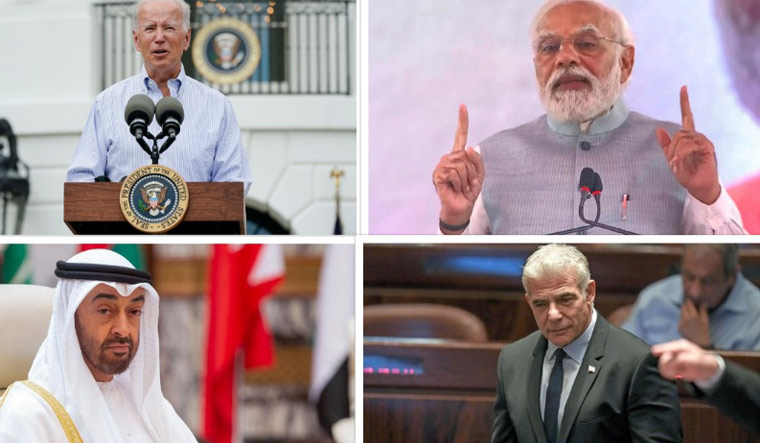Some groupings are formed instantly, while others takes years of simmering to materialise.
I2U2, the four-nation grouping of India, Israel, the US and the UAE, has upscaled from a foreign minister-level meeting in October 2021 (when it was first conceptualised) into a virtual summit of the top leaders, to be held on July 14. In sharp contrast, the eastern foursome, or the Quadrilateral Security Dialogue between the US, Japan, India and Australia, took around a decade to shape up, from the time it was first proposed in 2007 by then Japanese prime minister, late Shinzo Abe. Quad went into the back-burner, with Australia having a bromance with China at that point and India being reluctant to take any action that would cause annoy China. It was only in 2019, when the global realities changed, that the Quad, or Quad 2.0 took off. It has now become an organisation with a multi-faceted approach to common concerns—climate change, space, infrastructure and health—though it still treads cautiously on the security aspect.
I2U2 is a spin-off of the Abraham Accord, which saw Israel making diplomatic pacts with the Islamic world, the UAE being the first among them.
With the Quad, the China factor is the adhesive, even though the 'C' word is not mentioned in any of the statements. The member countries say that economy is the rallying point of I2U2. Indeed, the official name of this grouping is the prosaic International Forum for Economic Cooperation. Unlike Quad, which is a getting together of democracies, in I2U2, one of the partners, UAE, is not a democracy. While there are many areas of common interest between these nations, the areas of divergence cannot be ignored. However, in recent times, partner nations have learnt that they may not be on the same page in every issue, and that they have to work their relationships around diverging global viewpoints.
The US and India are large economies, Israel is a very small one. The UAE is somewhere in between, though it offers a perfect platform for engaging with other economies, especially in the Arab world, explained Eugene Kandel, Israeli economist and co-chairman of the country's Start-Up Nation Policy Institute. “I see this grouping as a platform for creating joint solutions to big challenges like climate change. India can be the source and the place to install the solutions, (say for example a solution for stubble burning), while Israel could be the technology provider, UAE the trade facilitator, and the US and UAE, both as investors.''
Israel needs big economic partners to scale up its technology solutions—the size of the country is simply too small to restrict these inventions for the domestic market.
Kandel noted while the UAE and Israel had sub-diplomatic interactions for years, the Abraham Accord has given diplomatic heft to interactions. It eases out trade policies and makes the interactions, specially economic ones, easier. “We had pacts with Jordan and Egypt for years, but they were not economic ones. Even those countries now will see the advantage of economic tie-ups,'' he said.
India has a newly minted Free Trade Agreement with the UAE, which might become the template for pacts with other countries in the region, too. India and Israel have drafted a trade pact, but it is yet to be announced. A suitable occasion like the visit of the Israeli PM to India would be the ideal time for announcing it, but domestic politics in Israel have delayed the visit. On the trade front, India and the US, however, have not come to an agreement, yet. The balance of trade continues to be largely in favour of India, and both countries are tough negotiators. Will the I2U2 platform help in sorting out some of the barriers? It will definitely provide a platform for engagement and discussion.
The ministry of external affairs said the leaders, Narendra Modi, Joe Biden, Yair Lapid and Mohammed bin Zayed Al Nahyan will “discuss the possible joint projects within the framework of I2U2 as well as the other common areas of mutual interest to strengthen the economic partnership in trade and investment in our respective regions and beyond.” “These projects can serve as a model for economic cooperation and offer opportunities for our businesspersons and workers.''
There is a major point of divergence among I2U2 members, which is Russia. India has made its stance on Russia clear, it remains a steadfast friend, and will not join in any sanctions or diplomatic isolation of Russia, even as it reaches out in goodwill and help to both nations. It is a stand that the US, which is leading the anti-Russia diatribe, has had trouble reconciling with, but has had to accept. The UAE, as with much of the rest of Asia, too, has kept away form what the east sees as a largely western issue. Israel has many citizens of Russian descent, and many citizens who hold citizenship of both countries. Its ties with Russia are strong; however, diplomatically, Israel has aligned itself with the US.
While security and military are not in the ambit of the western Quad, these topics will certainly pop up in the discussion, specially since the US is the leading voice in sanctions against Russia. The member countries, however, know the potential that this grouping can have in the future, and may not want to jeopardise it by raising topics of disagreement at the first summit.
Just how strong this grouping will become is something which is still far in the future.





